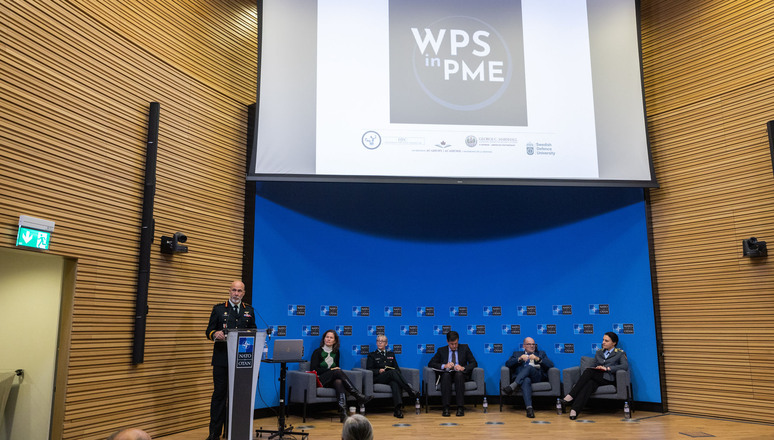On 15 November 2022, the Canadian Defence Academy, in partnership with the Swedish Defence University and the George C. Marshall Centre, hosted an event at NATO HQ, dedicated to Women, Peace and Security (WPS) in the Professional Military Education. This event was organised under the auspices of the Partnership for Peace Consortium of Defence Academies working group on WPS and co-chaired by Canada and Sweden.

Participants were officially welcomed by the Canadian Military Representative to NATO, Vice Admiral Scott Bishop who reiterated the importance of the NATO WPS’ agenda, at the strategic, operational and tactical levels. He added that “at the Madrid Summit, NATO Allies reiterated our continued pledge to advance a robust WPS agenda, including the incorporation of gender perspectives across NATO. The new Strategic Concept emphasizes the importance of investing in Human Security and the WPS Agenda across all Three Core Tasks – Deterrence and Defence, Crisis Prevention and Management, and Cooperative Security. With an Alliance of thirty, soon to be thirty-two, the significance of the WPS Agenda has been well established as part of NATO shared values and commitments”.
The Director General of the NATO International Military Staff, Lieutenant General Janusz Adamczak delivered a keynote address focused on the relevance of WPS to NATO and the importance of integrating the Gender Perspective as a crosscutting discipline in all domains. “In an era of changing threats and emerging security challenges, this includes questions related to gender equality and Human Security in a broader sense, and touches upon numerous military fields such as intelligence gathering, counter-terrorism, cyber security and force protection”. He noted that this is a continuous process, “this is not a sprint, it is a marathon. We need continuous engagement to raise awareness of the linkages between the gender perspective, NATO’s cross-cutting topics and security threats”. The Director General then touched upon existing initiatives to ensure the perspective is captured in all major work strands and education opportunities, i.e. through the Gender Focal Point network, topical Deep Dive sessions and ongoing efforts to bring the perspective into broader coordination and senior level meetings.
Participants then heard about the progress made in the area by Canada and the Canadian Armed Forces from Major General Lise Bourgon, Deputy Commander of the Military Personnel Command and the Canadian Armed Forces Champion for Women, Peace and Security. “Canada and its Armed Forces have been pushing forward on this agenda, we have implemented changes to our uniform policy to be more inclusive, we are working to improve our recruitment process and we working to improve the conditions for all our personnel. Canada is no longer just talking the talk but making really strives to walk the walk”, underlined Major General Bourgon.
The event continued with a topical roundtable discussion with prominent guests speaking on their respective areas of expertise: Dr. Annick Wibben, Professor at the Swedish Defence University; Dr. Knut Doermann, Head of the ICRC’s Delegation to the EU, NATO and the Kingdom of Belgium; Ambassador Eric Nelson, Ambassador-in-Residence at the George C. Marshall European Centre for Security Studies; Major Isabel Borkstett, Deputy Gender Advisor to the NATO International Military Staff; and Rear Admiral Rebecca Patterson, the Chief of Staff of the Chief Professional Conduct and Culture.
In the afternoon, participants toured a special poster gallery focused on WPS and Student-Centred Learning in Military Education and learn about how different military academies teach about gender and WPS. They were then invited to interact with WPS specialists at a thematic Marketplace. Themes presented included: “Women, Peace & Security Dimensions of the War in Ukraine; Student-centred Learning Approaches”; “Intersections of Cultural Heritage Protection: Cultural Property Protection and Women, Peace & Security”; “Integrating Insights from the Field of Intercultural Communication to Advance Women, Peace and Security Principles”; ” Engaging Men in Women, Peace & Security; “Intersectionality, Women, Peace and Security”; “Why and how gender perspective is essential for Resilience”, and “Institutionalizing Women, Peace and Security through Gender Focal Point Networks”.
